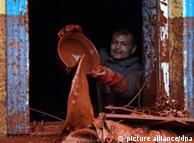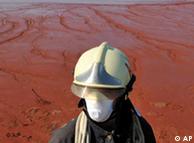Eastern Europe | 11.10.2010
CEO arrested over Hungarian toxic sludge crisis
Hungarian police have arrested Zoltan Bakonyi, CEO of MAL Rt., the Hungarian aluminum company that owned that plant, and Prime Minister Viktor Orban told parliament in Budapest that the government must now take over the company and freeze its assets.
The development comes as hundreds of volunteers, disaster-relief teams and engineers race against time to erect a new dam around a reservoir of chemical residue, which authorities fear could crumble if rain arrives as forecast later this week.
The new dam is expected to be completed on Monday evening.
Up to a million cubic metres of caustic red sludge poured from the waste reservoir of an alumina plant in western Hungary a week ago, leaving seven dead and a large area of countryside covered in red sludge.
A five-member EU civil protection team comprising French, Belgian, Swedish, Austrian and German experts has been dispatched to help limit the damage, the European Commission said in a statement.
EU chief Jose Manuel Barroso will also visit Hungary on Tuesday. Barroso is not expected to visit the site of the ecological disaster, but his previously-arranged talks with Orban are "timely," said European Commission spokesman Olivier Bailly.
Where to put the mud?  Bildunterschrift: Großansicht des Bildes mit der Bildunterschrift: The Hungarian government faces scrutiny over its handling of the mess
Bildunterschrift: Großansicht des Bildes mit der Bildunterschrift: The Hungarian government faces scrutiny over its handling of the mess
The environmental group Greenpeace, which measured the chemical content of the mud, said that the desperate efforts to contain the damage and prevent further spillage will be dwarfed by the massive clean-up operation that is yet to begin.
"They can't even think about cleaning up at the moment," Bernhard Obermayr, Greenpeace campaign director for Eastern Europe, told Deutsche Welle. "That will be the big challenge in the next weeks, months, years."
Obermayr expects the operation to take a long time. "They will have to remove this unbelievable quantity of poisonous mud, as well as contaminated earth, and deposit it somewhere safely," he said. "Hungary doesn't even have the deposit capacity for this quantity of toxic waste."
Since it is still unclear how much of the underlying earth has been contaminated, the extent of the clean-up operation is still pure speculation.
"One million cubic meters is more or less what has already spilled out, and another 500,000 could be added to that," he said.
"That is an immense quantity. We're talking about 40 square kilometers of polluted earth. And we don't know how deep the contamination is yet. If it's a meter rather than half a meter, then obviously that means twice as much earth."
 Bildunterschrift: Großansicht des Bildes mit der Bildunterschrift: Greenpeace says the clean-up could take yearsPrivatization blamed
Bildunterschrift: Großansicht des Bildes mit der Bildunterschrift: Greenpeace says the clean-up could take yearsPrivatization blamed
The Hungarian government has been careful to lay the blame for the catastrophe squarely with the operators of the aluminum plant, but Obermayr criticized the government's own response.
"The disaster happened last Monday, and we published the results of our tests last Friday," he said. "Until then, the government was silent about the extent to which the people living there were in danger. They didn't say anything about possible water contamination or even what chemicals we're dealing with. That really is very negligent."
Obermayr also said that very serious questions needed to be asked of the company. "A dam doesn't just break," he said. "Either there was too much sludge in the reservoir, or the dam was not properly maintained. In either case the owners have a very clear responsibility."
Greenpeace has also laid the blame on Hungary's privatization policy. "The company purchased the plant very cheaply in 1995, and have made huge profits from this plant since then," he said.
"Apparently either they didn't adhere to the safety regulations, or they over-burdened the dam in order to maximize the profits."
Greenpeace has also raised questions about the contingency plans for such an emergency. "We know that the company made no such plans," said Obermayr. "We can't prove whether the Hungarian authorities have acted negligently or not. But no-one comes out of this looking good."
Author: Ben Knight
Editor: Nathan Witkop

沒有留言:
張貼留言